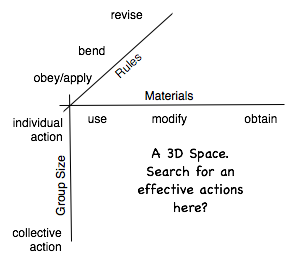Yeah. Notice how the neat vs. scruffy debate in computer science is related to this:
Bricolage: “(French, ‘doing odd jobs’). A characteristic (according to C. Levi-Strauss) of the early human mind, in contrast to modern scientific thinking. But bricolage is entirely rational (i.e. not pre-rational) in its own way. He introduced the term in The Savage Mind. A bricoleur is one who improvises and and uses any means or materials which happen to be lying around in order to tackle a task: ‘The bricoleur is adept at executing a great number of diverse tasks; but unlike the engineer, he does not subordinate each of them to the availability of raw materials and tools, conceptualized and procured specifically for this project; his instrumental universe is closed, and the rule of his game is to make do with the means at hand.’ In the making of myth, bricolage is the use of whatever happens to be ‘lying around,’ so that myth is both rational and improvisatory.” — www.bloomington.in.us/~okolicko/definitions.html
The book I’m reading about Self Efficacy attempts to define efficacy but Garrison Keiler put it well: “The ability to get up and do what needs to be done.” The book labors with some success to block out subspecies of efficacy. For example that ability to get stuff done within the limits of what is at hand v.s. the ability to get stuff done while bending the rules and reworking materials at hand.
I am effective if I bend a coat hanger to keep the hotel window held open at night. To me a coat hander is just a source of soft iron wire. To me that is an act of the first kind; a simple shaping of materials at hand. To the hotel it may appear instead a bit of rule bending bordering on vandalism. Category making in this kind of discussion ain’t easy, which is why the book is labored and long – I guess.
Another suggested partitioning: efficacy via collective vs. individual action. The author reveals his personal and culture preference for the individual. b He sorts the individual before the collective. So in his view collective action is an exception handler for failed individual efficacy. Should the means above prove insufficient then you might shift over to collective action. Using politics to rewrite the rules presumably. That’s too narrow a model of what collective action is good for; there is of course a bricolage of collective action.
All these means of achieving goals form camps: inside/bend/outside the rules; inside/outside the individual/collective boundary. The camps then lay claim to the generic labels primitive or modern, scruffy or neat. The scruffies in computer science have always worn the label with pride; like the some people wear the label hacker. But then a group’s self label always means to entirely different things depending on the speakers membership in the group. When other non-programers call me a “programmer” they know not of what they speak.
Dragged a word into service from a foreign language, like bricolage, brings the possibility of freeing up the discussion. Maybe? We should replace the term hacker with bricoleur. I kind of like that Levi-Strauss was using it to suggest savage.
Yeah! Let’s having an illustration.
